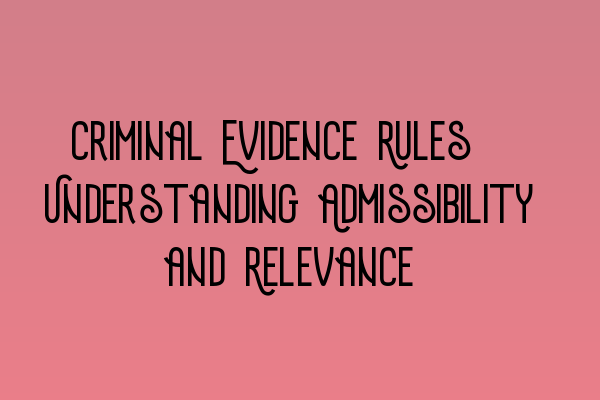Criminal Evidence Rules: Understanding Admissibility and Relevance
When it comes to criminal cases, evidence plays a crucial role in determining the guilt or innocence of the accused. The admissibility and relevance of evidence are governed by specific rules and regulations that shape the legal proceedings. As a solicitor specializing in criminal law, it is imperative to have a deep understanding of these rules to build a strong case for your clients.
Before we dive into the nuances of criminal evidence rules, it is essential to define what admissibility and relevance mean in the context of a trial.
Admissibility of Evidence
Admissibility pertains to whether pieces of evidence are allowed to be presented in court during trial proceedings. The admissibility of evidence is determined by various factors, including the nature of the evidence, how it was obtained, and its reliability.
The Criminal Justice Act 2003 outlines specific rules regarding the admissibility of evidence in criminal cases. For instance, illegally obtained evidence, such as evidence obtained through coercion or without a proper search warrant, may be deemed inadmissible in court. These rules are in place to ensure fairness and protect the rights of the accused.
In addition to the Criminal Justice Act, other legislation and case precedents also play a significant role in determining the admissibility of evidence. As a solicitor, you must stay updated with the latest legal developments and precedents to effectively argue for or against the admissibility of evidence in your clients’ cases.
Relevance of Evidence
The relevance of evidence refers to its connection to the facts of the case and its ability to prove or disprove a specific issue. To be considered relevant, evidence must have a logical and factual connection to the case at hand.
The inclusion of irrelevant evidence can unduly influence the court’s decision-making process and lead to an unfair trial. As a solicitor, it is your responsibility to ensure that only relevant evidence is presented in court. This involves carefully scrutinizing the evidence available and strategically selecting the most relevant pieces to support your client’s defense or prosecution.
Keeping Up with Changes
The field of criminal law is continuously evolving, with new legislation and precedents shaping the admissibility and relevance of evidence. It is crucial for solicitors to stay updated with these changes to provide the best possible representation for their clients.
At SQE Criminal Law & Practice Law UK, we understand the importance of ongoing professional development. Our team of expert solicitors keeps abreast of the latest legal developments and incorporates them into their legal strategies. We strive to provide our clients with the most effective representation by staying ahead in our field.
Conclusion
Understanding the admissibility and relevance of evidence is crucial for any solicitor practicing criminal law. It is essential to stay updated with current legislation and case precedents to ensure that only admissible and relevant evidence is presented in court. By adhering to these rules, you can build a strong case for your clients and contribute to a fair and just legal system.
